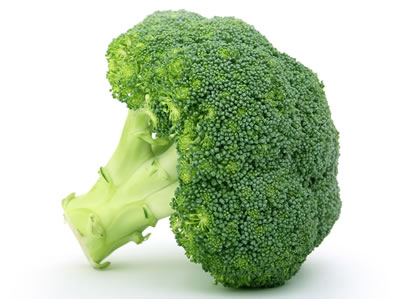Broccoli
Broccoli is a great source of vitamins K and C, a good source of folate (folic acid) and also providespotassium, fiber. Vitamin C – builds collagen, which forms body tissue and bone, and helps cuts and wounds heal. Vitamin C is a powerful antioxidant and protects the body from damaging free radicals.
100g of broccoli has:
- 2.5g fibre (15% RDA)
- Tons of viamin C: 150% of your RDA!
- Lots of viamin A: 640 IU is 25% of your RDA
- Lots of folate (250mcg - 60% RDA, preganant women need twice as much)
- Tons of viamin K1: 180 micrograms which is 100+% of your RDA (K1 is required for blood clotting and as a precursor for the amazing vitamin K2).
- Approx 5-10% RDA of calcium, magnesium, potassium and iron.

Broccoli an anti-inflammatory food. Inflammation is the cause of many of today’s chronic illnesses.
Increasing the amount of cruciferous vegetables in your diet, which include broccoli, kale, cabbage and cauliflower, rids the body of excess estrogen, thus increasing testosterone. This is a vegetable that contains DIM, a phytonutrient that is believed to help decrease the effect of estrogen. DIM may be a powerful way to prevent estrogen dominance. For women, this means a reduction in breast cancer risk and for men, it means avoiding the side effects of estrogen dominance such as man-boobs, mood swings and sex drive. Bodybuilders eat cruciferous vegetables in hopes of raising testosterone and reducing estrogen.
Minor problems with broccoli
Cruciferous vegetables such as broccoli contains small amounts of substances that can have a ‘goitrogenic’ effect. Goitrogens are substances that disrupt the production of thyroid hormones by interfering with iodine uptake in the thyroid gland. Our research would seem suggest that these substances become inactive with cooking, but they are still active in raw broccoli. The best advice is to cook broccoli. One, probably very smelly, study in humans found that the consumption of 15 cooked Brussels sprouts daily for four weeks had no adverse effects on thyroid function. Research also shows that goiters are not caused by iodine deficiency or by eating goitrogens, they are caused by the inflammation from chronic autoimmune thyroid disease (Hashimoto’s). In order to get rid of a goiter, a person needs to address the autoimmune thyroid disease, not remove goitrogens from their diet.
